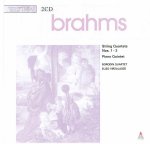The three string quartets and the F minor piano quintet by Brahms neatly fill these Teldec Ultima reissues. The recordings by the Borodin Quartet with Elizo Virzaladze in Op. 34 are fine sounding and opulent, and the performances are superior offerings that should satisfy demanding and repeated listening. In the Quintet, it’s the power and urgency that grips you, from the ominous unison of the opening to the unbridled ferocity of the scherzo. Virzaladze is a titanic pianist, and only in more reflective sections (chiefly in the andante) do you occasionally feel her instrument is slightly too dominant. Other pianists, such as Maurizio Pollini in his 1980 DG account with the Quartetto Italiano, and to an even greater extent Jenö Jandó on Naxos with the Kodály Quartet, secure better instrumental balance in dialogue and accompanimental passages where the piano is less important. Sonically, however, the Teldec recording is the best of the three, and provides pin-sharp clarity and natural spatial positioning of the voices, even though the piano may seem a bit too forward at climaxes.
This set also includes the three string quartets, again masterfully played by the Borodins, and very well engineered, too. Nos. 1 and 3 were recorded at Teldec’s Berlin studios, and No. 2 and the Quintet at the Snape Maltings Concert Hall, UK. You’re not likely to find performances of comparable stature very often, and probably not at all at this price. But if you’re prepared to pay more to have the clarinet quintet as a filler, you’ll find the Sony discs by the Juilliard Quartet (with Charles Neidich) give the music more of its expected radiance and lush autumnal coloration, in contrast to the Borodins’ clinically incisive, strongly analytical approach to Brahms.
































